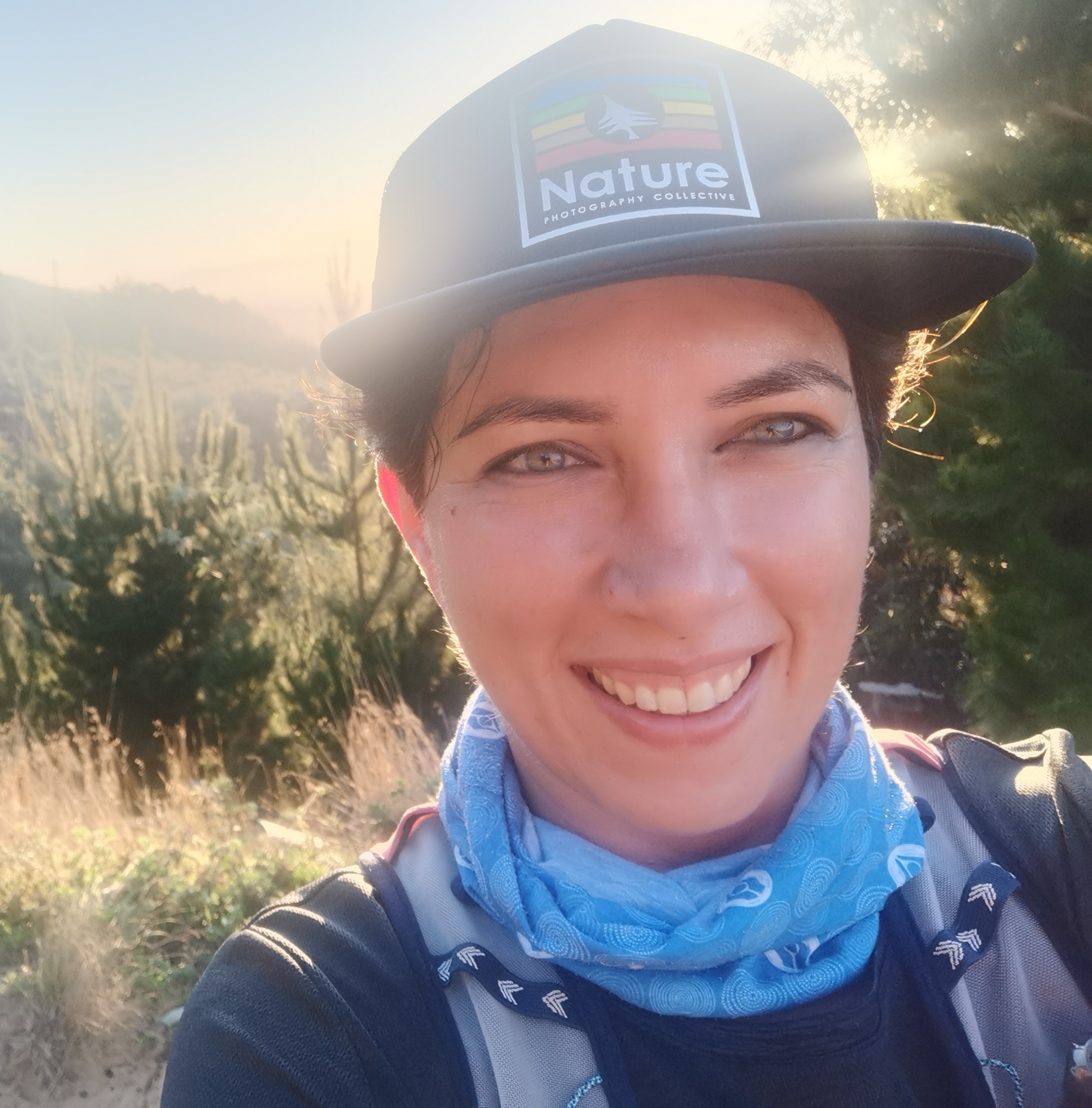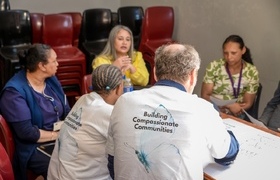Lessons from a Pandemic: Division of Public Health Medicine
18 July 2020 | Story Thania Gopal. Read time 4 min..png)
Team work. Collaboration. Learning and adapting. Building resilience. And showing vulnerability. These are some of the key lessons emerging from public health experts working at the cutting edge of the pandemic in the Division of Public Health Medicine, led by Professor Leslie London.
“Our staff have been deeply involved across the spectrum – organising the epidemic response teams, coordinating and carrying out contact tracing, managing surveillance and producing health intelligence for decision-making, modelling the epidemic, developing evidence-based guidelines, providing technical support for work across the health sector and with other sectors ranging from prisons to private industry to cope with epidemic. And on top of all that, managing under- and post-graduate teaching in this new environment”.
 London says the epidemic has really highlighted the importance of public health skills for all stakeholders – including students, partners, communities, and the health services. “The impact of the epidemic on an already stressed and fragile health system has been huge but if the care being delivered is able to manage the wave of patients with severe COVID-19, then it is also reflecting resilience.”
London says the epidemic has really highlighted the importance of public health skills for all stakeholders – including students, partners, communities, and the health services. “The impact of the epidemic on an already stressed and fragile health system has been huge but if the care being delivered is able to manage the wave of patients with severe COVID-19, then it is also reflecting resilience.”
A significant contribution to the Western Cape’s response to the pandemic is the creation of the Western Cape data dashboard on COVID- 19, a public-facing dashboard that is updated daily with the most relevant COVID- 19 information, produced by Public Health Medicine registrars and consultants in the provincial health department. “The value of data in helping the province to rethink its strategy has never been more clear. The Western Cape data dashboard on COVID-19 is the product of dedicated staff who have been able to turn information into health intelligence so that decision-making is informed,” says London.
Dr Muzzammil Ismail, a Public Health Medicine registrar in the Faculty of Health Sciences has been involved with designing and developing the front-end of the dashboard, which has received more than 700 000 views over the last two months with users from more than 120 countries. “There has been a lot of anxiety around COVID-19 and I believe transparency of data in a user-friendly format allows for some level of understanding, context and clarity for the general public,” says Ismail.
Managing bed escalation plan at Groote Schuur Hospital
Dr Shrikant Peters, a Public Health Medicine specialist and honorary lecturer in the Division has played a pivotal role at the coalface of the pandemic. Peters currently serves as the Medical Manager of the Main Theatre for Anaesthetics and Critical Care at Groote Schuur Hospital. He has been overseeing the implementation of the provincial COVID- 19 Intensive Care Unit (ICU) bed escalation plan at Groote Schuur Hospital, a complicated juggling act which involves prioritising COVID- 19 beds while ensuring other health priorities are met.
A major success for Peters and his team is not having a single member of the high-risk intubation team develop COVID- 19 occupationally during the high-risk procedures they have performed. In addition, the team has managed to triple the number of ICU beds they are running. But each day comes with new trials. “A huge challenge is keeping services running during cluster outbreaks amongst health care workers, as this can deactivate an entire service, and requires multiple outbreak investigations and contact tracing.”
Peters has also been supporting the Department of Anaesthesia's COVID- 19 intubation team, which provides advanced airway management services to the entire facility. He is currently involved in developing COVID- 19 Operating Rooms and ICU infrastructure plans and hopes to soon start preparing a re-escalation plan for theatre services. “Coordination of continuously changing theatre schedules have been particularly difficult, but we have made good use of online conferencing to remain in contact with the different surgical disciplines, nursing and anaesthetics.”
It is hard to comprehend how staff working in high-pressure environments manage to cope with the physical and emotional exhaustion over such an extended period. “I always emphasise that our first goal is to get each other through the immediate crisis – our most important resource are our health care workers, and the goodwill and grit they have shown in rising to the occasion. I also make a concerted effort to focus on long-term strategic planning even as we navigate the day-to-day crises,” says Peters.
“Healthcare workers are extremely resilient innately. They are also willing to risk exposures as long as they are allowed to fulfil their chosen scope of practice, provide high quality care and have the necessary protective equipment. The ability to scale-up services requires trust which can only be built up over time. People need to understand your motivations as a manager and believe that you have their wellbeing at heart.”
Guiding the response to the epidemic
The Division of Public Health Medicine has also contributed to contact tracing efforts, and managing district and sub-district response teams. Dr Natacha Berkowitz, a Public Health Medicine registrar is the City of Cape Town’s Public Health lead on the COVID- 19 outbreak in the Metro. As an epidemiologist, her responsibilities include not only guiding City Health’s overall response to the epidemic but also providing key public health insights and strategic guidance to various departments involved in the response. “I am so immensely proud and privileged to work with individuals across an organisation who are so truly dedicated to serving and protecting the communities of Cape Town. I have learnt the true value of team work, how to delegate and project manage,” says Berkowitz.
 Berkowitz also acknowledges numerous challenges such as ensuring that clinical staff have the necessary protection to do their job and feel supported as they face immense mental and physical strain. Addressing the public’s fears and anxieties is also hard work in a shifting landscape. “Communication of an ever-changing strategy to the communities is hugely challenging. To explain the strategic approach of the Health Department (and other departments) in a manner which community members understand is difficult, and the frequent changing of the messaging makes it more so.”
Berkowitz also acknowledges numerous challenges such as ensuring that clinical staff have the necessary protection to do their job and feel supported as they face immense mental and physical strain. Addressing the public’s fears and anxieties is also hard work in a shifting landscape. “Communication of an ever-changing strategy to the communities is hugely challenging. To explain the strategic approach of the Health Department (and other departments) in a manner which community members understand is difficult, and the frequent changing of the messaging makes it more so.”
Another personal challenge for Berkowitz is balancing the many hats she wears. Other than advising the health department, she is responsible for coordinating a consortium which aims to establish technical proficiencies in the detection of the SARS-CoV-2 virus in waste water and to establish a SARS-CoV2 waste water surveillance network. As part of this work, she is supervising an MPH student who, as part of her practicum, is mapping sampling points across Cape Town for future monitoring. The Waste Water Based Epidemiology consortium includes stakeholders from across the country and from various institutions and recently succeeded in isolating the SARS-CoV-2 virus from waste water. The next step will be establishing trial surveillance activities in various metros in South Africa.
Ensuring the safety of the Faculty community and broader public
Dealing with a pandemic has required all hands on deck. Emeritus Associate Professor David Coetzee, a retired public health specialist from the Division was invited to chair the Health Advisory Working Group which provides health-related advice to the University’s COVID- 19 Coordinating Committee (CCC), chaired by Chief Operating Officer of UCT, Dr Reno Morar. The CCC advises the Vice-Chancellor and senior management of the University on the management of the epidemic as it relates to the University community and also how it can assist with managing the broader epidemic in South Africa. “All staff and students have worked together at all hours and ‘beyond the call of duty’, to ensure that the University and related services continue to function under lockdown. The Faculty of Health Sciences has provided particular support to clinical services,” says Coetzee.
As public health specialists living and working through a pandemic, the team emphasised the importance of breaking down silos and working collaboratively across sectors and disciplines. London also acknowledged the strain and real threat of burn-out for staff, many of whom have being working full-out since the pandemic started, under very tough conditions.
A key learning for Berkowitz has been when senior staff have been willing to ‘let down their guard’ and the space that has opened up for others. “I have also witnessed true vulnerability amongst senior colleagues who have showed their human side when they felt overwhelmed. I think this is such an important lesson for all individuals who work within our health sector – to realise that we are all human and vulnerable. Healthcare workers are often seen as superheroes and we are used to just soldiering on. Hopefully the lessons learnt from this pandemic will teach us to be kinder and more compassionate to ourselves and our colleagues,” says Berkowitz.
 This work is licensed under a Creative Commons Attribution-NoDerivatives 4.0 International License.
This work is licensed under a Creative Commons Attribution-NoDerivatives 4.0 International License.
Please view the republishing articles page for more information.










